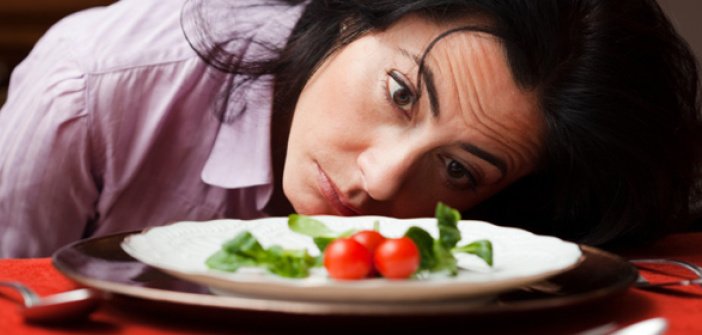Will Someone Please Think of the Children? | Why We’ve Got to Stop Obsessing About Weight
Both obesity and eating disorders are an increasing cause for concern, but what can we do to guide the teens in our midst in the right direction? Stop talking about weight, says new research. Recently released guidelines from the American Journal of Pediatrics have recommended that parents and doctors should avoid “weight talk” in front of children.
According to the study, parents who count calories and comment on weight, either their child’s or their own, put their children at a higher risk of developing symptoms of disordered eating. Dr. Golden, professor of paediatrics at Stanford University, says that parents “who talk about their own bodies and weights can inadvertently encourage their kids to have body dissatisfaction, which we see in half of teen girls and a quarter of boys.”

At the age of 12, I could rattle off Weight Watchers points with my times tables. It wasn’t something I had made a vested effort in, it was just absorption. For as long as I could remember, any reference to food was followed by some kind of a comment on its potential to abet or destroy the pilgrimage towards the holy ‘Golden Stone’ (some glorious honour bestowed onto one when a stone is lost).[pullquote]At the age of 12, I could rattle off Weight Watchers points with my times tables. It wasn’t something I had made a vested effort in, it was just absorption.[/pullquote]
‘How many points is that?’ was just part of the vernacular in our house. My mother and her sisters, who had professed on many occasions that ours was one of those genetically damned families who just had to ‘watch their weight,’ gave a running commentary on every morsel that appeared in front of them. I thought my mother was the most beautiful woman I had ever seen, but she knew better. She’d sigh and grab the slight covering of fat around her middle at the swimming pool. She had to wear black sometimes because it was more ‘slimming.’
I learned to approach food with a healthy dose of scepticism. It was a tricky business; food was to be feared because it could fool you into being fat. Out of ill-informed theories, childish interpretations, and a healthy covering of pre-pubescent puppy fat, blossomed a full-blown eating disorder. I was armed with all the contorted knowledge I needed to make a real go of it and, in mere months, I was the thinnest I’ve ever been in my life. And the saddest. It broke my mother’s heart. She had no idea that all that background noise of food preoccupation would manifest itself in her daughter in such a cruel way.

I ate a little bit less. I lost a little bit of weight. The comments started to roll in: ‘Oh, you’ve lost weight! A few pounds makes all the difference, doesn’t it?’ (I was 12 years old). But it felt good, so I ate less. And less. And before I knew it, I was rocking myself to sleep at night, nursing hunger pains, and telling myself that this was some kind of achievement. When I’d wake, I’d agonise about the amount of calories in Apple A versus Apple B. Both would lay untouched in the fruit basket as I left for school, reassuring my mother that I’d had cereal while she was in the shower.
After a couple of years of fighting against the help offered to me, something finally cracked and I knew I needed to change this. I remember crying one day, just sobbing with the weight of it all. I was exhausted from the strain of having to consider every morsel that passed my lips. I was exhausted from the lonely burden of the whole thing.
The road to a more positive relationship with food was a long one and, 10 years on, I still have to remind myself to stay on course. But I’m gentler with myself now. I had to learn that part from scratch though. My mother was an indispensable support, but if we’re talking about learning from example, I had to try to unlearn the perfectionism and self-criticism I learned on her knee.

As the digital age surges forward, there’s no outrunning the bombardment of perfectly formed Instagram beach bodies, weight-loss blogs and ad campaigns that would give even Elle MacPherson an inferiority complex. Body image is always going to be in our faces. Around every corner, at the end of every swipe of our fingers, is another opportunity to question our collective self-worth. There’s no escaping it. What we need now is resilience.[pullquote]What if mothers taught their little girls to smile when they looked in the mirror instead of scrutinising their flaws?[/pullquote]
What if mothers taught their little girls to smile when they looked in the mirror instead of scrutinising their flaws? What if they celebrated good food as fuel for your body and not a harbinger of imperfection? What if little girls saw the significant women in their lives throw on a swimsuit and not care who was looking as they walked towards the sea? What if they heard women complement each other’s smiles and bravery and kindness and not just how well they looked when they achieved the ‘Golden Stone’?
What if we learned that dressing up was actually fun and that changing rooms were not the high court of the body image inquisition? What if we heard our mothers speak about the things they actually liked about their bodies? What if they told us that we were worth so much more than just our bodies?

My mother didn’t know that her self-deprecation would trickle down to me. She always told me that I was amazing and that I could do whatever I wanted in this world. We learn what we see though, don’t we? I internalised that self-criticising dialogue and went to town with it.
When I was little, I thought my mother was invincible and amazing and an angel (I still do). So why don’t we, the aunts, big sisters, mothers, grandmothers, godmothers, teachers and second cousins, fill that wonderful idolising tendency of little girls with the good stuff? Let’s teach them self-compassion first-hand. Let’s give them beliefs strong enough to weather the storm of social media and the rest.
